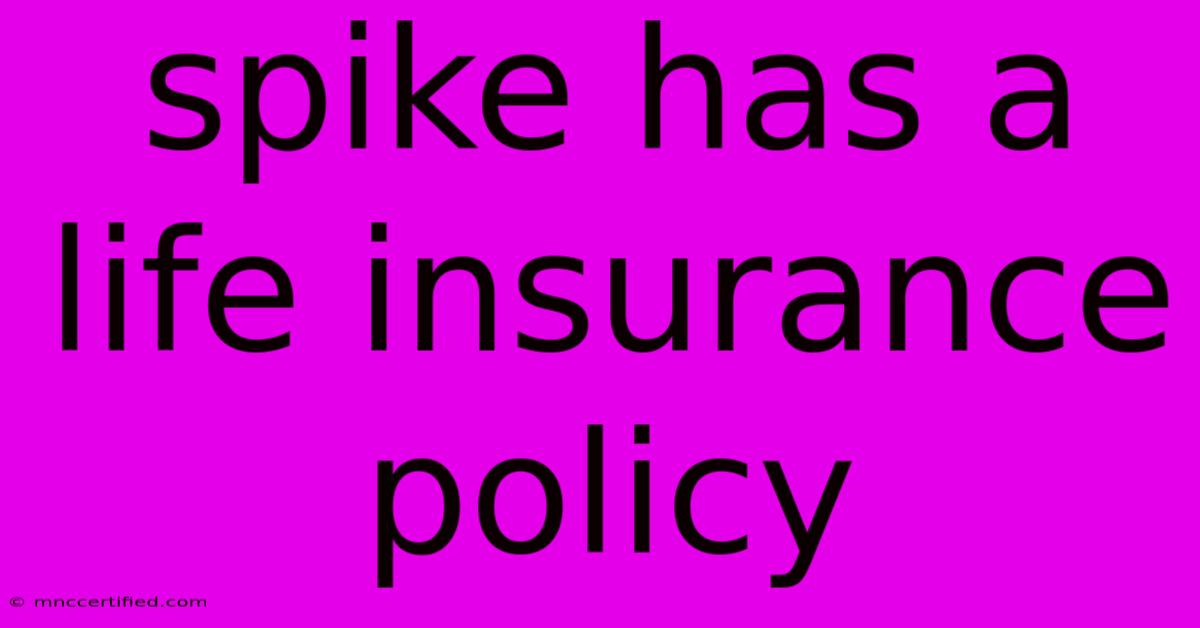Spike Has A Life Insurance Policy

Table of Contents
Spike Has a Life Insurance Policy: Understanding the Implications
Life insurance is a complex topic, and when we consider a fictional character like Spike – whether from a TV show, book, or game – it adds another layer of intrigue. Let's explore the potential implications of Spike having a life insurance policy, considering various scenarios and the broader implications of insurance within narrative.
Why Would Spike Have Life Insurance?
The presence of a life insurance policy for Spike immediately raises questions about his circumstances. Several factors could explain this:
-
Financial Responsibility: Does Spike have dependents? A spouse, children, or even business partners who would be financially impacted by his death? A policy would provide a safety net for them, ensuring their financial stability. This adds depth to his character, hinting at a hidden softer side or responsibilities he carries.
-
Business Interests: Is Spike involved in a risky profession or business venture? Life insurance could be a crucial part of risk management, protecting his investments or business partners from financial loss in the event of his demise. This could be relevant if he's a bounty hunter, a smuggler, or involved in any high-risk occupation.
-
Debt Settlement: Does Spike owe significant debts? A life insurance policy could be used to settle these debts upon his death, protecting his assets and preventing financial hardship for his creditors. This could suggest a complex past or ongoing financial struggles.
-
Estate Planning: Even if Spike doesn't have direct dependents, he might have a life insurance policy as part of his estate planning. This ensures that his assets are distributed according to his wishes after his death, preventing potential disputes and ensuring a smooth transition. This reveals a degree of foresight and planning, perhaps contrasting with his otherwise impulsive persona.
The Narrative Implications
The inclusion of a life insurance policy for Spike isn't just a random detail; it actively shapes the narrative:
-
Potential Plot Points: The policy itself could become a plot device. Perhaps the beneficiary is disputed, leading to conflict and intrigue. Or maybe the policy is used as leverage against Spike, revealing vulnerabilities and weaknesses.
-
Character Development: Spike's life insurance policy illuminates aspects of his personality and motivations. It adds layers to his character, revealing hidden depths and contributing to a more well-rounded and believable portrayal.
-
Suspense and Tension: The existence of the policy creates suspense. Will Spike die? Who will benefit from his policy? These questions introduce dramatic tension and keep the audience engaged.
-
Themes of Mortality and Legacy: The policy directly confronts the themes of mortality and legacy. It forces the audience to contemplate Spike's life and what he leaves behind. This can add a deeper, more meaningful layer to the story.
SEO Considerations for a Fictional Character
When discussing a fictional character and life insurance, SEO requires a nuanced approach. Focus on broader themes related to life insurance and its real-world applications, using Spike's situation as an illustrative example. Keywords like "life insurance implications," "fictional character insurance," "narrative storytelling and insurance," and "estate planning" are relevant. Avoid keyword stuffing and focus on natural language. Remember to link to authoritative sources on life insurance if discussing specific policy types or legal aspects.
By integrating the concept of Spike's life insurance policy subtly and strategically into the narrative, you create a richer, more engaging story while also utilizing SEO techniques effectively to broaden the reach of your work. Remember to always prioritize a compelling narrative; SEO should enhance, not replace, great storytelling.

Thank you for visiting our website wich cover about Spike Has A Life Insurance Policy. We hope the information provided has been useful to you. Feel free to contact us if you have any questions or need further assistance. See you next time and dont miss to bookmark.
Featured Posts
-
Croatia Vs Portugal Nations League Live Score
Nov 19, 2024
-
Bo Nix Denvers Rookie Qb Rise
Nov 19, 2024
-
Arkansas Insurance License Course
Nov 19, 2024
-
Gyno Surgery Covered By Insurance
Nov 19, 2024
-
Individual Hunting Insurance Cost
Nov 19, 2024